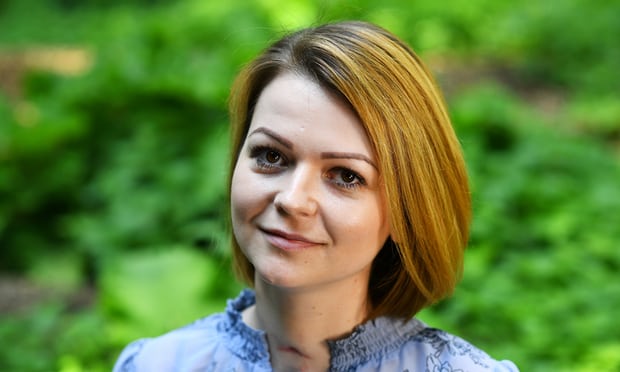In her first appearance since being discharged from hospital, Yulia said that she flew to London on 3 March to visit her father, something she had done regularly in the past. The Skripals were found a day later in a comatose condition on a park bench in the centre of Salisbury.
“After 20 days in a coma I woke to the news that we had both been poisoned,” she said. “I still find it hard to come to terms that both of us were attacked. We are so lucky to both have survived this attempted assassination.
She continued: “Our recovery has been slow and extremely painful. The fact that a nerve agent was used to do this is shocking. I don’t want to describe the details but the physical treatment was invasive, painful and depressing.”
Skripal was speaking from a secret location in London, where she is under police guard. She was discharged from Salisbury district hospital five weeks after the poisoning and has not been seen by the media until now. Her father, a former GRU intelligence officer, was discharged last week.
She said she was now making progress but admitted “my life has now been turned upside down by the devastating changes thrust upon me both physically and emotionally”.
She added: “I take one day at a time and want to help care for my dad till his full recovery. In the longer term I hope to return home to my country.”
Skripal spoke in Russian to the news agency Reuters. She supplied a statement that she said she had written herself in Russian and English. The Russian version had several crossings out and corrections. After reading her statement in front of camera, she signed both documents. She declined to answer questions.
Her comments capture some of the horror of the the past few week. But Skripal said nothing about who she thinks might have carried out the attack – or why.
Detectives have said that novichok was smeared on the front door handle of Sergei Skripal’s semi-detached Salisbury home. The highly toxic nerve agent was developed in the late Soviet Union in a secret research facility based in the town of Shikhany.
In March the British prime minister, Theresa May, told parliament it was “highly likely” that Moscow carried out the poisoning. She argued that only the Kremlin and its powerful spy agencies had a reason to target Skripal, who served a prison sentence in Russia after he was caught spying for MI6. He was exchanged in 2010 as part of a spy swap and settled in the UK.
It is unclear if Skripal was still actively involved in sensitive intelligence work. A report last week in the New York Times claimed that Skripal was giving briefings to Estonian and Czech spy agencies. His regular trips to Europe were approved by MI6, the paper said.
Sir Mark Sedwill, the UK’s national security adviser, has released classified intelligence which he says bolsters the case for Russian state involvement. Sedwill revealed that GRU cyber-specialists had targeted Yulia Skripal’s email account from 2013. He also said that GRU units had experimented with novichok, including testing it on door handles.
Moscow has insisted it had nothing to do with the attack. In a series of counter-accusations, Russia’s ambassador to the UK, Alexander Yakovenko, has suggested British security services were behind the operation. He has also accused the UK of destroying evidence, “forcibly isolating” the Skripals, and denying them Russian diplomatic assistance.
The Kremlin spokesman Dmitry Peskov told Reuters that he thought Yulia Skripal’s latest statement was made under duress. “We have not seen her or heard from her,” he said when asked to comment on the story.
Speaking before the camera, Yulia Skripal said: “I’m grateful for the offers of assistance from the Russian Embassy. But at the moment I do not wish to avail myself of their services,” Skripal wore a light blue summer dress. She had a scar on her neck.
In an apparent reference to her cousin Viktoria, who has appeared frequently on Russian state TV, Yulia said: “Also, I want to reiterate what I said in my earlier statement, that no one speaks for me, or for my father but ourselves.”
“I am grateful to all of the wonderful, kind staff at Salisbury hospital, a place I have become all too familiar with. I also think fondly of those who helped us on the street on the day of the attack,” she said.
Yulia Skripal’s reluctance to attribute blame for her poisoning is understandable. If and when she flies back to Moscow she will come under pressure to endorse the Kremlin’s version of events: that Moscow is the victim of a provocative and baseless accusation made by the British establishment.
In 2006 two Moscow assassins poisoned the Russian dissident Alexander Litvinenko with a radioactive cup of tea. A public inquiry concluded that Russia’s president, Vladimir Putin, had “probably approved” the assassination, which was coordinated by the spy agency he had previously headed, the FSB.
At the time Litvinenko’s father bitterly denounced Putin and blamed him for his son’s murder. He fled Russia and went to live in exile in Italy. In 2012, however, broke and homesick, Walter Litvinenko returned home. He apologised to Putin and recently appeared on a TV sofa with Andrei Lugovoi, who is accused of Litvinenko’s murder.
More about: #Yulia-Skripal
















































